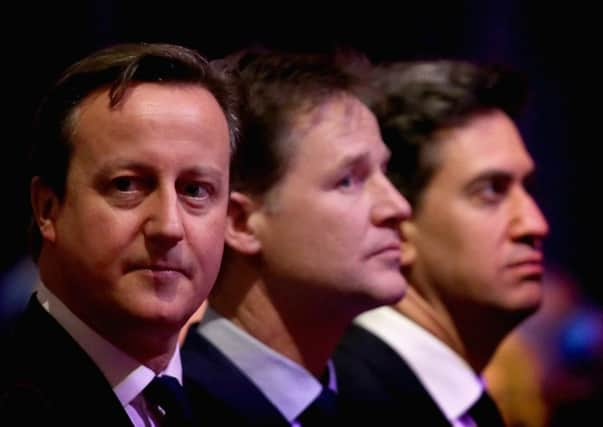Leaders: An unusual General Election | Exam system


THE notion that British politics was nothing more than a two-horse race ended in 2010 with a general election result that required the Conservatives and Liberal Democrats to form a coalition government in order to secure a parliamentary majority.
But, almost five years ago, we could not be sure whether this outcome represented a blip in the traditional electoral cycle which had, for generations, produced clear Labour or Tory victories.
Advertisement
Hide AdAdvertisement
Hide AdAs we look towards the election in May, in less than 100 days, it seems clear that, in fact, things have changed. And this year, it may be even more difficult for either of the largest parties to win enough seats to govern alone.
In 2010, much was made about the impact of Liberal Democrat leader Nick Clegg, but the result, rather than showing any progress for his party, suggested an electorate that lacked huge enthusiasm for either Gordon Brown or David Cameron.
Enter, in 2015, two high-profile and hugely popular figures whose success, thus far, has been predicated upon the skilful political exploitation of the fatigue that has been engendered by the age of austerity.
In Scotland, Nicola Sturgeon’s SNP consistently outpolls Labour by 2-1 when it comes to voting intentions. This could mean a Labour wipeout in Scotland. And every Labour seat lost in Scotland makes the prospect of Ed Miliband becoming prime minister more unlikely.
In the past a Labour leader could plan a general election campaign around a relentless attack on Tory policies. This year, Mr Miliband will not only have to fight Mr Cameron but also the SNP and, to a lesser but significant extent, the Greens.
Labour, understandably, argues that only it can prevent a Tory government. But, while we might expect this line to find favour with a sizeable portion of the Scottish electorate, there is little sign that it is yet doing so.
The First Minister’s appearance on TV debates will only help boost Ms Sturgeon’s profile and make the SNP seem more relevant than ever before during a Westminster campaign. Mr Miliband cannot underestimate the risk the SNP represents to his prime ministerial ambitions.
In England, Mr Cameron has his own troubles to deal with. Just as Ms Sturgeon and the SNP threaten to hobble Mr Miliband, so Nigel Farage and Ukip threaten to do the same to the Prime Minister.
Advertisement
Hide AdAdvertisement
Hide AdThe Prime Minister is most comfortable with a moderate rhetoric, aimed at centre-ground voters, but this year he will face the difficult task of matching that with a message to those in his party who might feel Mr Farage better represents their views.
The next 100 days will be a general election campaign like no other in living memory. Parties that once struggled to be heard from the fringes now stand to play a crucial role in shaping how Britain is governed.
FOLLOW US
SCOTSMAN TABLET AND MOBILE APPS
Exam system poses questions
THE transition of Scottish schools to the new Curriculum for Excellence (CfE) was always going to be difficult, but few would have predicted the mess it is in today.
As we report in our news pages, many of the Higher exams sat by pupils in the forthcoming exam diet will be under the old system rather than the new CfE.
The problem is worse for some subjects than it is for others. For some reason, science subjects have proved particularly difficult to adapt to the new way of working.
There are differences too, between regions, as well as between individual schools within those regions.
The now-sacked education secretary, Michael Russell, recognised some time ago that he was going to have to allow schools to adopt CfE at their own pace – within reason.
The simple reason was that some schools, and some teachers, were simply unable to make the transition – requiring wholesale changes to the methodology and teaching materials – as fast as other schools and other teachers.
Advertisement
Hide AdAdvertisement
Hide AdMr Russell eventually had to recognise that the switch to CfE exams was going to be a process, not an event.
This was probably wise, to prevent the switch collapsing into chaos. But the consequences, now becoming clear, are still regrettable.
The array of outcomes across disciplines and regions places a huge burden on the Scottish Qualifications Authority. Somehow, they have to ensure parity of assessment across all these variables, so that a pupil’s eventual grades accurately reflect his or her abilities.
When the results are out this summer there are bound to be pupils – and parents – who question whether this has been achieved successfully.